Connor Boyle
The NLP Sandbox: an efficient model-to-data system to enable federated and unbiased evaluation of clinical NLP models
Jun 28, 2022



Abstract:Objective The evaluation of natural language processing (NLP) models for clinical text de-identification relies on the availability of clinical notes, which is often restricted due to privacy concerns. The NLP Sandbox is an approach for alleviating the lack of data and evaluation frameworks for NLP models by adopting a federated, model-to-data approach. This enables unbiased federated model evaluation without the need for sharing sensitive data from multiple institutions. Materials and Methods We leveraged the Synapse collaborative framework, containerization software, and OpenAPI generator to build the NLP Sandbox (nlpsandbox.io). We evaluated two state-of-the-art NLP de-identification focused annotation models, Philter and NeuroNER, using data from three institutions. We further validated model performance using data from an external validation site. Results We demonstrated the usefulness of the NLP Sandbox through de-identification clinical model evaluation. The external developer was able to incorporate their model into the NLP Sandbox template and provide user experience feedback. Discussion We demonstrated the feasibility of using the NLP Sandbox to conduct a multi-site evaluation of clinical text de-identification models without the sharing of data. Standardized model and data schemas enable smooth model transfer and implementation. To generalize the NLP Sandbox, work is required on the part of data owners and model developers to develop suitable and standardized schemas and to adapt their data or model to fit the schemas. Conclusions The NLP Sandbox lowers the barrier to utilizing clinical data for NLP model evaluation and facilitates federated, multi-site, unbiased evaluation of NLP models.
UnifiedSKG: Unifying and Multi-Tasking Structured Knowledge Grounding with Text-to-Text Language Models
Jan 20, 2022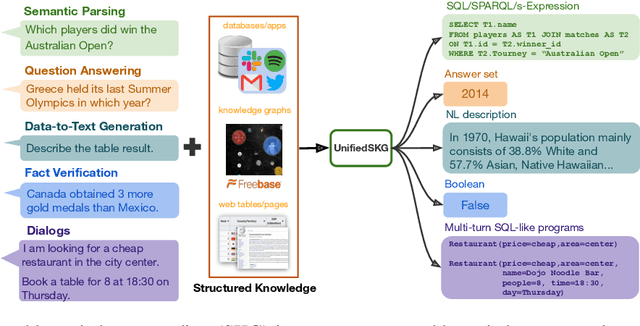
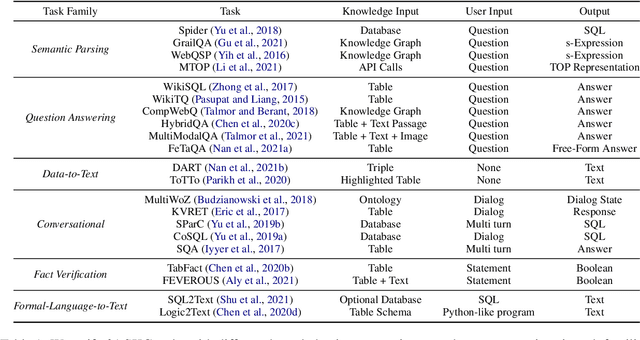
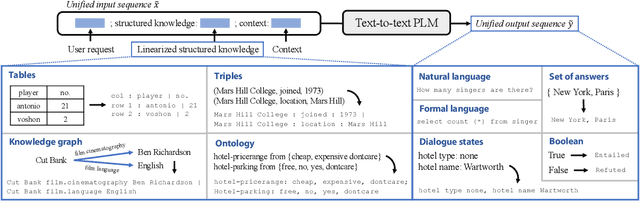
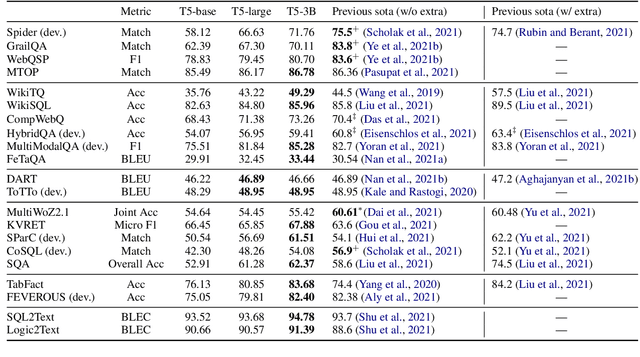
Abstract:Structured knowledge grounding (SKG) leverages structured knowledge to complete user requests, such as semantic parsing over databases and question answering over knowledge bases. Since the inputs and outputs of SKG tasks are heterogeneous, they have been studied separately by different communities, which limits systematic and compatible research on SKG. In this paper, we overcome this limitation by proposing the SKG framework, which unifies 21 SKG tasks into a text-to-text format, aiming to promote systematic SKG research, instead of being exclusive to a single task, domain, or dataset. We use UnifiedSKG to benchmark T5 with different sizes and show that T5, with simple modifications when necessary, achieves state-of-the-art performance on almost all of the 21 tasks. We further demonstrate that multi-task prefix-tuning improves the performance on most tasks, largely improving the overall performance. UnifiedSKG also facilitates the investigation of zero-shot and few-shot learning, and we show that T0, GPT-3, and Codex struggle in zero-shot and few-shot learning for SKG. We also use UnifiedSKG to conduct a series of controlled experiments on structured knowledge encoding variants across SKG tasks. UnifiedSKG is easily extensible to more tasks, and it is open-sourced at https://github.com/hkunlp/unifiedskg Latest collections at https://unifiedskg.com.
NL-Augmenter: A Framework for Task-Sensitive Natural Language Augmentation
Dec 06, 2021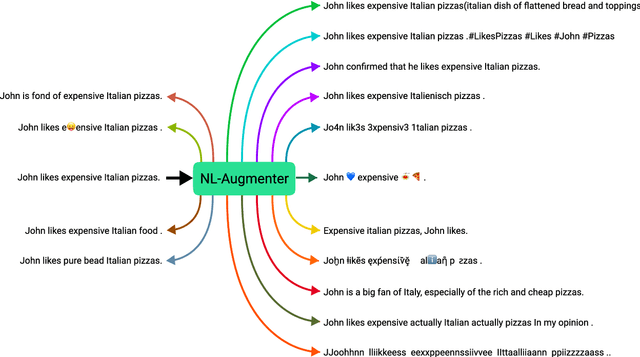
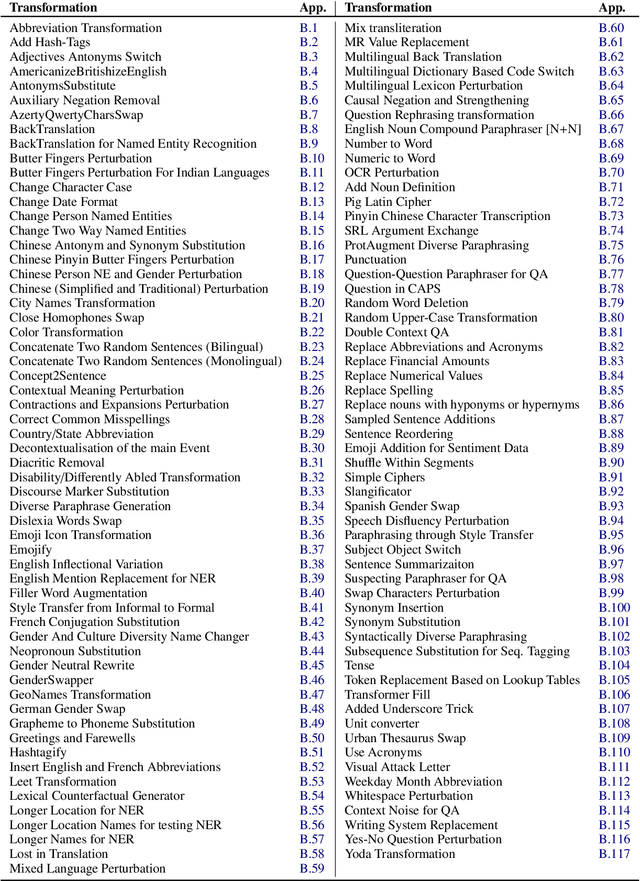
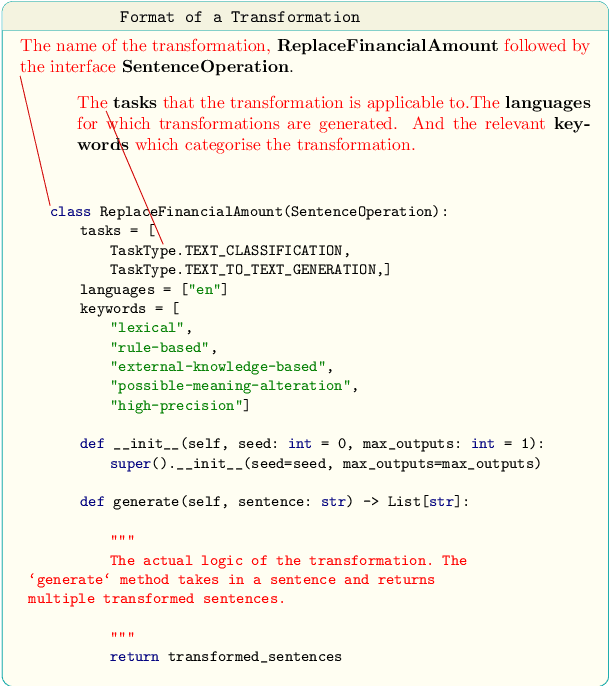
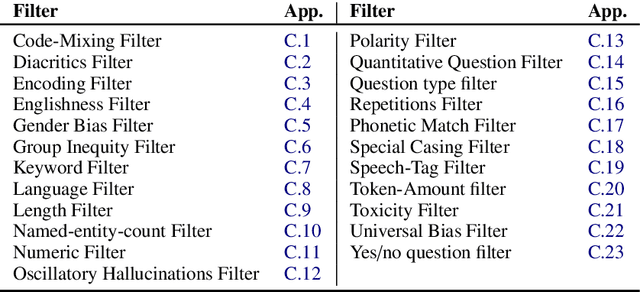
Abstract:Data augmentation is an important component in the robustness evaluation of models in natural language processing (NLP) and in enhancing the diversity of the data they are trained on. In this paper, we present NL-Augmenter, a new participatory Python-based natural language augmentation framework which supports the creation of both transformations (modifications to the data) and filters (data splits according to specific features). We describe the framework and an initial set of 117 transformations and 23 filters for a variety of natural language tasks. We demonstrate the efficacy of NL-Augmenter by using several of its transformations to analyze the robustness of popular natural language models. The infrastructure, datacards and robustness analysis results are available publicly on the NL-Augmenter repository (\url{https://github.com/GEM-benchmark/NL-Augmenter}).
 Add to Chrome
Add to Chrome Add to Firefox
Add to Firefox Add to Edge
Add to Edge